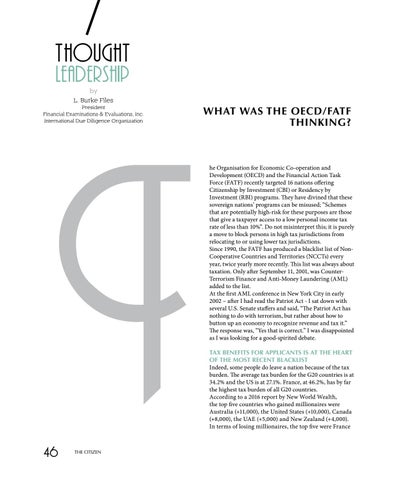thought leadership by L. Burke Files President Financial Examinations & Evaluations, Inc. International Due Diligence Organization
WHAT WAS THE OECD/FATF THINKING?
he Organisation for Economic Co-operation and Development (OECD) and the Financial Action Task Force (FATF) recently targeted 16 nations offering Citizenship by Investment (CBI) or Residency by Investment (RBI) programs. They have divined that these sovereign nations’ programs can be misused; “Schemes that are potentially high-risk for these purposes are those that give a taxpayer access to a low personal income tax rate of less than 10%”. Do not misinterpret this; it is purely a move to block persons in high tax jurisdictions from relocating to or using lower tax jurisdictions. Since 1990, the FATF has produced a blacklist list of NonCooperative Countries and Territories (NCCTs) every year, twice yearly more recently. This list was always about taxation. Only after September 11, 2001, was CounterTerrorism Finance and Anti-Money Laundering (AML) added to the list. At the first AML conference in New York City in early 2002 – after I had read the Patriot Act - I sat down with several U.S. Senate staffers and said, “The Patriot Act has nothing to do with terrorism, but rather about how to button up an economy to recognize revenue and tax it.” The response was, “Yes that is correct.” I was disappointed as I was looking for a good-spirited debate. TAX BENEFITS FOR APPLICANTS IS AT THE HEART OF THE MOST RECENT BLACKLIST Indeed, some people do leave a nation because of the tax burden. The average tax burden for the G20 countries is at 34.2% and the US is at 27.1%. France, at 46.2%, has by far the highest tax burden of all G20 countries. According to a 2016 report by New World Wealth, the top five countries who gained millionaires were Australia (+11,000), the United States (+10,000), Canada (+8,000), the UAE (+5,000) and New Zealand (+4,000). In terms of losing millionaires, the top five were France
46
THE CITIZEN








